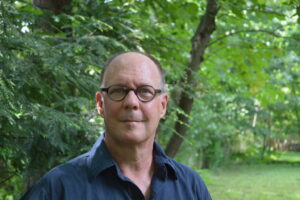
Two answers. I’m traveling this week, and yesterday just bought a copy of Chen Chen’s new book of poems Your Emergency Contact Has Experienced an Emergency. I’m also reading Katy Didden and Kevin Tseng’s inventive, gorgeous Ore Choir: The Lava on Iceland and today I’ve been studying a few Emily Dickinson poems again for an essay I’m writing.
At home—where I’ll be again in a few days—on my nightstand and desk I’ve got many books I’m currently reading, including Jesse Ball’s Autoportrait and the galley of Alice Fulton’s Coloratura on a Silence Found in Many Expressive Systems, and I’m rereading Stan Plumly’s Summer Celestial and Anne Carson’s Nay Rather, and for the umpteenth time looking back with wonder through Arthur Sze’s Sight Lines.
Literature is a huge field, so I’ll stick with contemporary poetry, which is huge enough. I’m cheered and instructed by the vast diversity of new poetry—so many more voices, communities, cultural stances, personal narratives, and so much formal variety. It’s the busiest and most varied period in all of American poetic history. Long poems, short poems, documentary poems, deeply intimate poems, nature and urban and political and, well, you name it. There are poets doing such important work in so many directions and making so many kinds of music with their art. I’m not sure there are any more truly great poets now than ever, but there are certainly more poets doing good and inclusive work. There’s also a lot more awful poetry.
I’m not cheered by some things. Professionalization and branding. The hurtful, ever-widening prize system. Poets who bounce from residency to fellowship to residency. The bad practice of simultaneous submissions. The misleading narrative that editors and writers are antagonists. The shallow and dim-witted social media approach to poetry. Poetry as a market commodity. The really worrisome lack of serious, sustained critical writing about new poetry. And in the art itself, I’m unengaged by poetry-as-memoir, poet as Hero, poet as trauma-machine, sloppy writing, poetry that has little sense of its own aesthetic or cultural history, the glib, the pithy nugget, the fawning…
Probably Leaves of Grass by Walt Whitman and Writings to an Unfinished Accompaniment by W. S. Merwin.
A trap suggests a hunter. I’m not sure there are traps as much as there are pitfalls and dead ends. A poet should be cautious of fame, the desire for fame, the effects of fame. A poet should be skeptical of the quick laugh or the witticism (instead of wisdom). Poets should be wary of velocity. There is just no hurry in poetry—the art takes its time and unfolds on its own. Poets should be careful to make sure a poem is really finished and not toss it out into the world (or into the submission systems) immediately. Likewise, it’s important to remember that so many of the tactics of a poem are there to mitigate against velocity; a poem wants you to take time, to linger, to deepen your attention, to reread, to abide inside the music and narrative of the work itself. There is just no hurry in poetry; you want to write something of such substance and care that it will not erode or break—or at least not evaporate too quickly. Finally, don’t be misled into thinking that the newest poetry is the best poetry. Poetry doesn’t improve. It evolves, and the steps and directions of its evolution are fascinating, vital, ever-changing. But it is not a competition, and it does not improve.
My writing isn’t really “work”, if the question is essentially asking about my career. That is, writing poems is not a source of livable income. For work, I teach, and I love teaching. That is my occupation. My vocation is as a poet. At one point long ago I thought maybe I’d make a living as a guitarist. I thought maybe I’d go to law school. I’m glad and grateful that my career has been teaching, and I’ve taught from 8th grade through high school to undergraduate and graduate students.
David Baker is a poet, educator, editor, and literary critic. He was born in 1954 in Bangor, Maine, grew up in Jefferson City, Missouri, and since 1983 has lived in central Ohio. He received his B.S.E. and M.A. degrees in English from the University of Central Missouri and his Ph.D. in English from the University of Utah, where he also served from 1980-83 as Editor and Poetry Editor of Quarterly West.
David Baker is the author or editor of nineteen books, including thirteen books of poetry, most recently Whale Fall (2022, W. W. Norton), Swift: New and Selected Poems (2019, W. W. Norton), Scavenger Loop (2015, W. W. Norton) and Never-Ending Birds (2009, W. W. Norton), which was awarded the Theodore Roethke Memorial Poetry Prize in 2011, and six books of prose, most recently Seek After: On Seven Modern Lyric Poets (2018, SFASU).
Find more information on Baker’s latest book Whale Fall here: http://www.davidbaker.website/whale-fall/


